Strategy →
→

- 29 Feb 2024
- HBS Case
Beyond Goals: David Beckham's Playbook for Mobilizing Star Talent
Reach soccer's pinnacle. Become a global brand. Buy a team. Sign Lionel Messi. David Beckham makes success look as easy as his epic free kicks. But leveraging world-class talent takes discipline and deft decision-making, as case studies by Anita Elberse reveal. What could other businesses learn from his ascent?

- 09 Jan 2024
- In Practice
Harnessing AI: What Businesses Need to Know in ChatGPT’s Second Year
Companies across industries rushed to adopt ChatGPT last year, seeing its potential to streamline tasks formerly handled by people and vendors at much higher cost. As generative AI enters its next phase in 2024, what can leaders expect? Harvard Business School faculty members highlight four trends to watch.
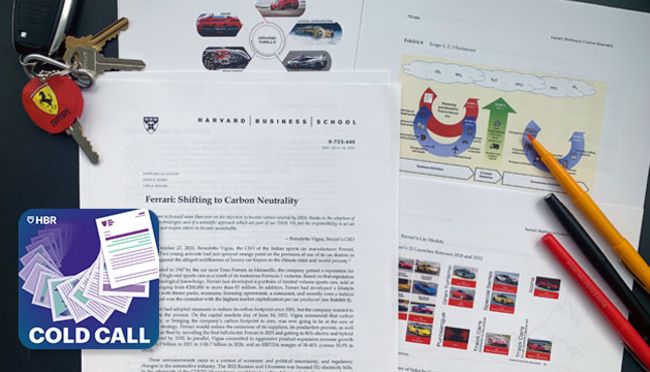
- 12 Dec 2023
- Cold Call Podcast
Can Sustainability Drive Innovation at Ferrari?
When Ferrari, the Italian luxury sports car manufacturer, committed to achieving carbon neutrality and to electrifying a large part of its car fleet, investors and employees applauded the new strategy. But among the company’s suppliers, the reaction was mixed. Many were nervous about how this shift would affect their bottom lines. Professor Raffaella Sadun and Ferrari CEO Benedetto Vigna discuss how Ferrari collaborated with suppliers to work toward achieving the company’s goal. They also explore how sustainability can be a catalyst for innovation in the case, “Ferrari: Shifting to Carbon Neutrality.” This episode was recorded live December 4, 2023 in front of a remote studio audience in the Live Online Classroom at Harvard Business School.
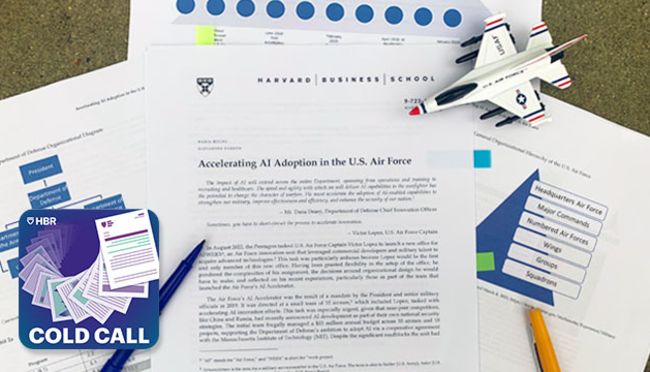
- 24 Oct 2023
- Cold Call Podcast
How the United States Air Force Accelerated AI Adoption
In August 2022, the Pentagon tasked U.S. Air Force Captain Victor Lopez with launching a new Air Force innovation unit that leveraged commercial developers and military talent to acquire advanced technologies. Having been granted flexibility in the setup of the office, Lopez pondered the complexities of his assignment and the decisions around organizational design he would have to make. It’s often believed that only small start-up organizations can innovate, but a lot of innovation happens in big organizations, including government. Harvard Business School assistant professor Maria Roche is joined by Major Lopez to discuss the challenges of digital transformation in a large bureaucratic organization and the specific choices the U.S. Air Force needed to make when launching its AI Accelerator in her case, "Accelerating AI Adoption in the United States Air Force."
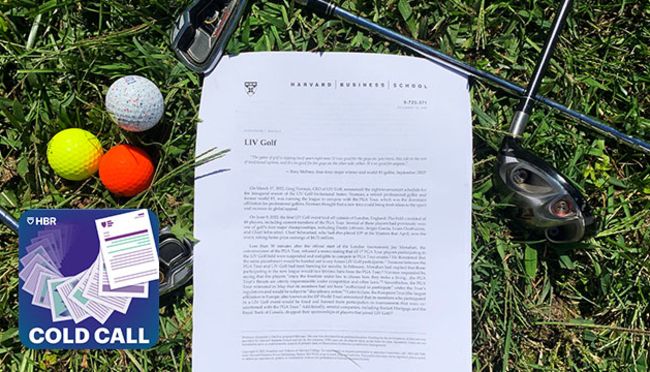
- 26 Sep 2023
- Cold Call Podcast
The PGA Tour and LIV Golf Merger: Competition vs. Cooperation
On June 9, 2022, the first LIV Golf event teed off outside of London. The new tour offered players larger prizes, more flexibility, and ambitions to attract new fans to the sport. Immediately following the official start of that tournament, the PGA Tour announced that all 17 PGA Tour players participating in the LIV Golf event were suspended and ineligible to compete in PGA Tour events. Tensions between the two golf entities continued to rise, as more players “defected” to LIV. Eventually LIV Golf filed an antitrust lawsuit accusing the PGA Tour of anticompetitive practices, and the Department of Justice launched an investigation. Then, in a dramatic turn of events, LIV Golf and the PGA Tour announced that they were merging. Harvard Business School assistant professor Alexander MacKay discusses the competitive, antitrust, and regulatory issues at stake and whether or not the PGA Tour took the right actions in response to LIV Golf’s entry in his case, “LIV Golf.”

- 26 Sep 2023
- Book
Digital Strategy: A Handbook for Managing a Moving Target
Digital strategy demands significant organizational energy at many companies. By the time teams have adapted to newly implemented technology, another platform has emerged to replace it. A book coedited by Feng Zhu offers a guide for executives trying to manage the chaos.

- 19 Sep 2023
- HBS Case
How Will the Tech Titans Behind ChatGPT, Bard, and LLaMA Make Money?
It seems like anything is possible with generative AI right now. But how will companies profit from those big ideas? Andy Wu breaks down the potentially painful tradeoffs that tech firms might face as artificial intelligence enters its next phase.

- 29 Aug 2023
- Cold Call Podcast
As Social Networks Get More Competitive, Which Ones Will Survive?
In early 2023, TikTok reached close to 1 billion users globally, placing it fourth behind the leading social networks: Facebook, YouTube, and Instagram. Meanwhile, competition in the market for videos had intensified. Can all four networks continue to attract audiences and creators? Felix Oberholzer-Gee discusses competition and imitation among social networks in his case “Hey, Insta & YouTube, Are You Watching TikTok?”
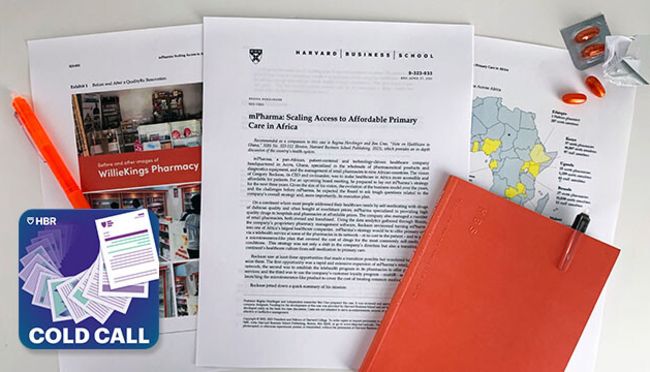
- 01 Aug 2023
- Cold Call Podcast
Can Business Transform Primary Health Care Across Africa?
mPharma, headquartered in Ghana, is trying to create the largest pan-African health care company. Their mission is to provide primary care and a reliable and fairly priced supply of drugs in the nine African countries where they operate. Co-founder and CEO Gregory Rockson needs to decide which component of strategy to prioritize in the next three years. His options include launching a telemedicine program, expanding his pharmacies across the continent, and creating a new payment program to cover the cost of common medications. Rockson cares deeply about health equity, but his venture capital-financed company also must be profitable. Which option should he focus on expanding? Harvard Business School Professor Regina Herzlinger and case protagonist Gregory Rockson discuss the important role business plays in improving health care in the case, “mPharma: Scaling Access to Affordable Primary Care in Africa.”

- 05 Jul 2023
- HBS Case
What Kind of Leader Are You? How Three Action Orientations Can Help You Meet the Moment
Executives who confront new challenges with old formulas often fail. The best leaders tailor their approach, recalibrating their "action orientation" to address the problem at hand, says Ryan Raffaelli. He details three action orientations and how leaders can harness them.

- 07 Jun 2023
- HBS Case
3 Ways to Gain a Competitive Advantage Now: Lessons from Amazon, Chipotle, and Facebook
Remember the Sony Librie? Some people considered it superior to Amazon's Kindle, but it didn't end up the market leader. Rebecca Karp breaks down three methods that companies use to create more value than their rivals—an edge that can make all the difference.
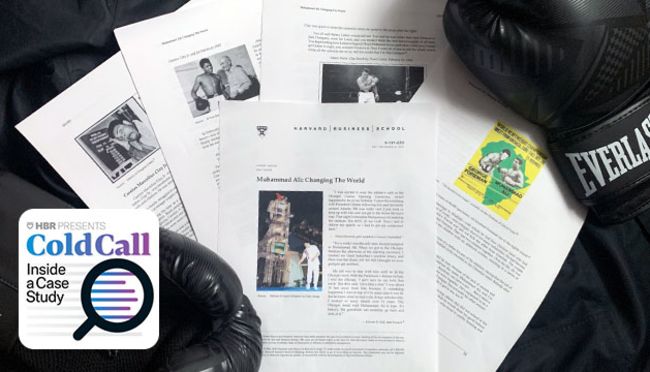
- 28 Feb 2023
- Cold Call Podcast
Muhammad Ali: A Case Study in Purpose-Driven Decision Making
Muhammad Ali, born Cassius Marcellus Clay Jr., rose from a poor family in segregated Louisville, Kentucky to international fame, winning three heavyweight boxing titles and becoming a civil rights leader and role model for millions of people around the world. How did he do it? Early in his career, Ali’s creativity and hard work helped him overcome significant obstacles. Rather than letting his fear of flying keep him from competing in the 1960 Olympics, he traveled to Italy wearing a parachute -- and easily won the gold medal in boxing. When he returned to the U.S. as a gold medalist, Ali used his growing fame to bring attention to racism and humanitarian causes he supported, including his then-controversial decision to refuse to fight in the Vietnam War. Professor Robert Simons discusses how Ali made decisions throughout his life and career to leave a lasting impact on the world in his case, “Muhammad Ali: Changing the World.”

- 19 Jan 2023
- Research & Ideas
What Makes Employees Trust (vs. Second-Guess) AI?
While executives are quick to adopt artificial intelligence, front-line employees might be less willing to take orders from an algorithm. Research by the Laboratory for Innovation Science at Harvard sheds light on what it takes for people to get comfortable with machine learning.
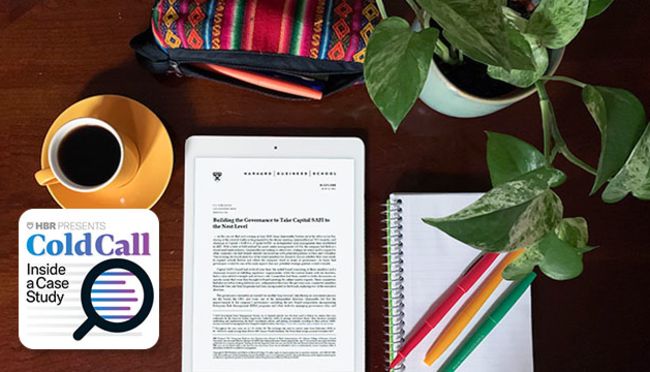
- 04 Oct 2022
- Cold Call Podcast
Cold Call: Corporate Governance and Growth Strategy at Capital SAFI
Jorge Quintanilla Nielsen started the independent asset management firm Capital SAFI in 2007. Now a leader in Bolivia’s closed-end funds industry with a total of $430 million in assets under management, Quintanilla planned to expand into other countries, like Peru and Colombia. He knew that governance would be one of the main aspects potential partners would evaluate. Capital SAFI’s board had evolved over time with the establishment of a governance committee, an assessment process for the board, professional development offerings for board members, tools to manage governance risk, and succession plans for board members and company executives. Would local and foreign investors be impressed by those measures or were additional improvements needed? Professor V. G. Narayanan discusses the importance of corporate governance in his case, “Building the Governance to Take Capital SAFI to the Next Level.”

- 07 Jul 2022
- HBS Case
How a Multimillion-Dollar Ice Cream Startup Melted Down (and Bounced Back)
A Brooklyn-based ice cream shop was getting buzz, and Disney was pitching a brand partnership. So how did the business wind up filing for bankruptcy? A case study by Thomas Eisenmann and Lindsay N. Hyde examines the rise and fall—and recent rebound—of Ample Hills Creamery.
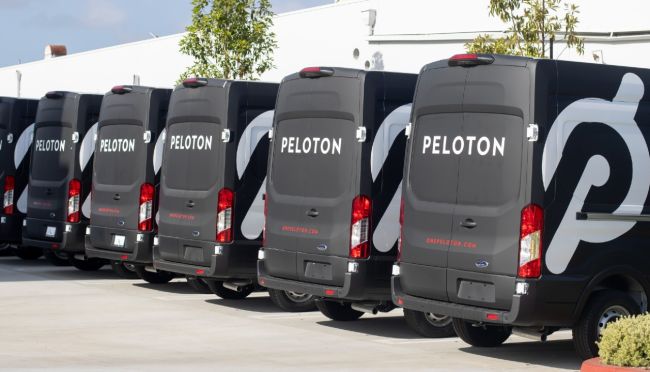
- 30 Jun 2022
- HBS Case
Peloton Changed the Exercise Game. Can the Company Push Through the Pain?
When COVID-19 closed gyms, seemingly everyone rushed to order a Peloton bike and claim a spot on the company's signature leader board. And then things quickly went downhill. A case study by Robert Dolan looks at the tough road the exercise equipment maker faces.

- 21 Jun 2022
- HBS Case
Free Isn’t Always Better: How Slack Holds Its Own Against Microsoft Teams
What will it take to win the collaboration app wars: massive scale or a loyal following? A case study by David Yoffie digs into the intense competition between Microsoft Teams and Salesforce's Slack.

- 28 Apr 2022
- Research & Ideas
Can You Buy Creativity in the Gig Economy?
It's possible, but creators need more of a stake. A study by Feng Zhu of 10,000 novels in the Chinese e-book market reveals how tying pay to performance can lead to new ideas.

- 18 Apr 2022
- HBS Case
Dick’s Sporting Goods Followed Its Conscience on Guns—and It Paid Off
After the 2018 school shooting in Parkland, Florida, Dick's Sporting Goods' CEO declared: "I don't want to be part of the story anymore." Two new case studies by George Riedel go inside the retailer's decision to remove certain firearms from stores and restrict gun sales. Open for comment; 0 Comments.

Open Source Software: The $9 Trillion Resource Companies Take for Granted
Many companies build their businesses on open source software, code that would cost firms $8.8 trillion to create from scratch if it weren't freely available. Research by Frank Nagle and colleagues puts a value on an economic necessity that will require investment to meet demand.